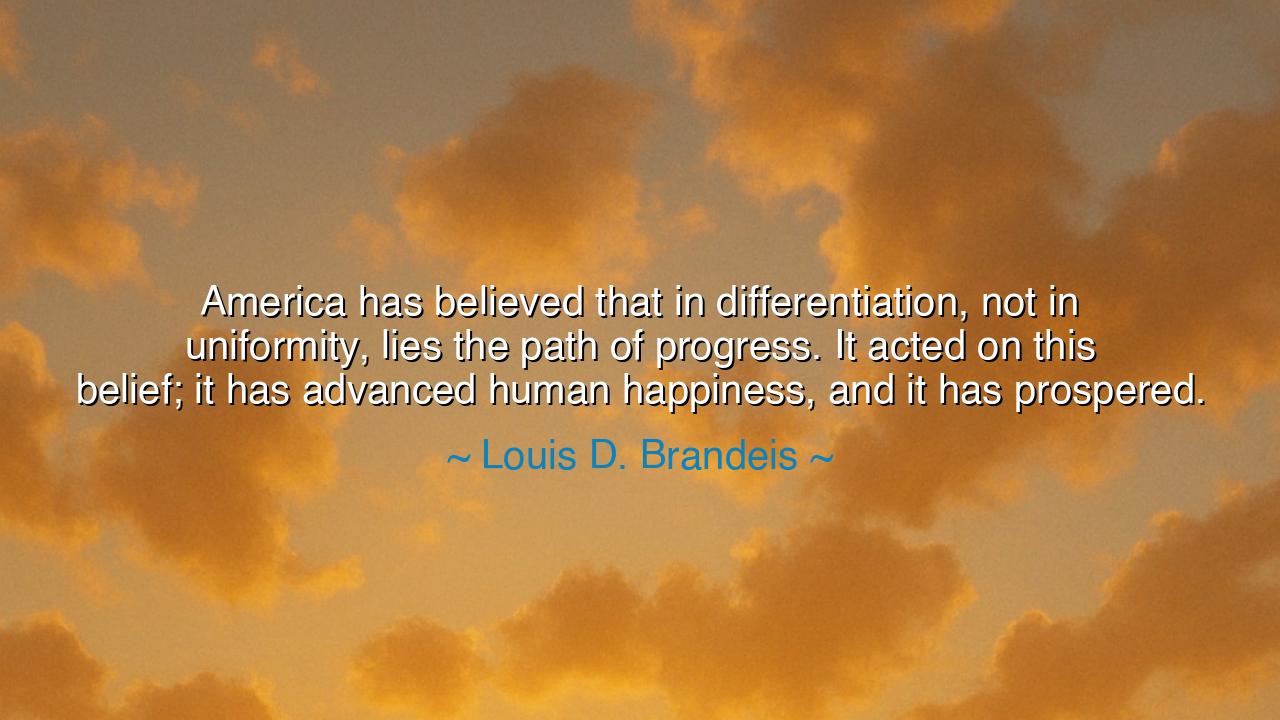
America has believed that in differentiation, not in uniformity
America has believed that in differentiation, not in uniformity, lies the path of progress. It acted on this belief; it has advanced human happiness, and it has prospered.






“America has believed that in differentiation, not in uniformity, lies the path of progress. It acted on this belief; it has advanced human happiness, and it has prospered.” Thus spoke Louis D. Brandeis, the great jurist and philosopher of democracy, whose mind burned with both intellect and idealism. In this statement, he captures one of the highest truths of civilization: that strength does not spring from sameness, but from diversity — that the freedom to differ, to create, to speak, and to live according to one’s conscience is the heartbeat of progress. For a nation that silences difference is a nation that silences life itself.
Brandeis, a Justice of the United States Supreme Court, uttered these words during a time of transformation in America — an era when waves of immigrants brought new faiths, languages, and dreams to its shores, and when modern industry and social change stirred both hope and fear. He saw that the future of democracy depended not on enforcing uniformity, but on embracing differentiation — the myriad forms of human thought and expression that together shape the destiny of a free people. In his eyes, America’s greatness lay not in one voice, but in the harmony of many voices, each distinct yet joined in purpose.
To understand the depth of this vision, we must remember that Brandeis spoke as both a son of immigrants and a servant of justice. Born to Jewish parents who fled persecution in Europe, he knew from history what happens when nations demand conformity — when they fear the unfamiliar and crush the individual in the name of order. Yet he also saw in America a new experiment: a land where difference was not a weakness to be erased but a source of innovation and vitality. By allowing men and women to think freely, work independently, and live according to their unique gifts, the nation had kindled the fires of creativity and prosperity unseen in the old empires of the world.
The meaning of his words reaches beyond politics or law — it is a philosophy of life. Uniformity breeds stagnation; it is the death of imagination. A field of identical flowers pleases the eye for a moment, but soon grows dull. Yet a garden filled with many colors and shapes — each plant thriving according to its nature — becomes a vision of abundance. So too with human society: it is in the difference of thought, of culture, of courage, that new discoveries are made, new art is born, and new wisdom arises. To seek progress is to welcome the unknown, to honor the unique, and to cherish the voice that dares to differ.
Consider the example of Thomas Edison, whose restless curiosity refused the uniform path of convention. In his time, many believed that gaslight would forever rule the night; yet Edison imagined another way, and through countless failures, he gave the world the electric light. Or think of Harriet Tubman, who defied the laws of her day to lead her people toward freedom. Each of these souls walked a different road — unapproved, unorthodox, even dangerous — yet through their courage to be different, they advanced both human happiness and the moral prosperity of their nation. Their lives are living proof of Brandeis’s belief: that differentiation is the womb of progress.
But the justice also warned that this sacred diversity must be protected with courage. For there will always be those who find safety in sameness, who would trade liberty for the comfort of conformity. The temptation to silence the different voice — whether by law, by ridicule, or by fear — is ancient and recurring. Yet each time a society yields to it, it begins to die from within. The fire of freedom is not sustained by agreement, but by the friction of thought. Only when men and women are free to disagree can truth refine itself; only when ideas compete can wisdom grow strong.
Let this then be the lesson for all generations: honor difference — in your nation, in your neighbor, and in yourself. Do not seek a world of sameness, for such a world would be silent, colorless, and still. Instead, celebrate the mosaic of humanity — each culture, each voice, each dream — for together they form the living spirit of civilization. Where there is freedom to differ, there will be progress; where there is respect for all, there will be peace.
Thus, the words of Louis D. Brandeis stand not only as praise of America, but as an eternal principle for all peoples: that true prosperity is born from diversity, not uniformity; from courage, not fear; from freedom, not control. When men and women are free to think and create according to their nature, the world itself moves forward. Let us therefore guard that freedom, nurture our differences, and remember always that in the harmony of many voices lies the music of humanity — and in that music, the promise of happiness for all.






AAdministratorAdministrator
Welcome, honored guests. Please leave a comment, we will respond soon